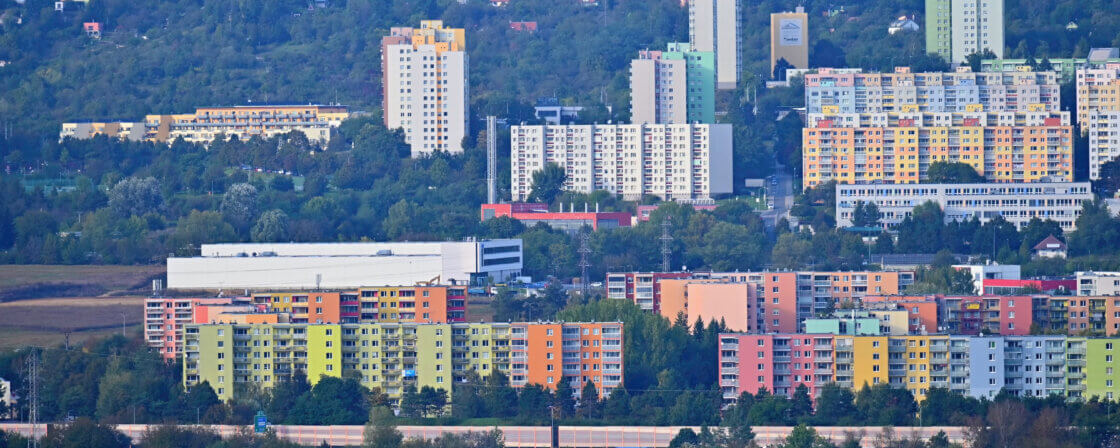How to file a real estate tax return
You must fileyour property tax return by 31 January at the latest if you acquired the property last year (e.g. by purchase, inheritance or gift), if there has been a change to your property (e.g. an extension, change of acreage or use), if you have become a co-owner, or if you have sold only part of your property and continue to own another property in the same region.
You can obtain a real estate tax form either in person at any local tax office or online at the Tax Forms section of the Internal Revenue Service website.
You can file your tax return in two ways – paper or electronically. In paper form, it can be sent by post to the office under whose jurisdiction your property falls (depending on the region). You can file your return electronically via the mojedane.cz portal. You can use your bank identity, data box or eObčanku to log in.
If you have properties in different counties, you must file a separate return for each county. If you own multiple properties within the same county, you can include them all in one return filed with the relevant tax office.
Are you solving a similar problem?
Not sure how to do your taxes properly so you don't get it wrong?
We can help you navigate the law, whether it’s dealing with a specific tax situation, preparing for an audit by the tax authority or defending yourself in court.
I want to help
- When you order, you know what you will get and how much it will cost.
- We handle everything online or in person at one of our 6 offices.
- We handle 8 out of 10 requests within 2 working days.
- We have specialists for every field of law.
When to pay property tax by
The property tax due date is 31 May. However, if the amount exceeds CZK 5,000, you can divide it into two instalments – the first is due by 31 May and the second by 30 November.
How to pay property tax
You can pay the tax in several ways:
- By bank transfer: the most convenient option. The tax office will send you the payment details (by mail, email or post) and you make the transfer from your account.
- Cash: either by postal order from the tax office or directly at the cash desk of any tax office.
- Via SIPO: this option must be activated in advance. You fill in the notification, provide the SIPO link number and deliver everything to the relevant tax office (separate for each region).
- From an overpayment of another tax: if you have an overpayment of, for example, income tax, the property tax can be paid automatically – either ex officio or at your request.
How to calculate the property tax on a property (flat)
The calculation of property tax is governed by the Real Estate Tax Act and, in the case of residential units, is calculated according to several steps. The decisive factors are the size of the apartment, its location and the applicable coefficients.
Who pays the tax and what it applies to
The tax is always paid by the owner of the flat, regardless of whether he/she occupies the flat himself/herself or rents it out. In the case of residential units, it is important to know that the tax does not apply to the co-ownership share of the common parts of the building or to any co-ownership share of the land under the building. This is not taxed separately, but is only reflected in a slightly higher coefficient in the tax calculation.
Tip for article
Are you planning on renting an apartment? We will draw up or review a lease agreement tailored to your case.
Calculation basis – floor area and coefficient 1.20 or 1.22
The basis for the calculation is the floor area of the flat in square metres as at 1 January of the year in question.
This area is then multiplied by one of the following coefficients:
- 1.20 – if the apartment is not connected to the land (typically, for example, in apartment buildings without a share in the land).
- 1.22 – if the flat is connected to the land (you also own a share of the land under the building or functionally connected to it).
This adjusted value is referred to as the adjusted floor area.
Tax rate – CZK 3.50 per m²
The basic tax rate of CZK 3.50 per m² is applied to the adjusted floor area. This rate is fixed and the same for all dwelling units regardless of their location.
Coefficient according to the size of the municipality
The result is further multiplied by a coefficient according to the size of the municipality, which is determined by law on the basis of the last census. This coefficient takes account of the fact that housing in larger towns tends to be more lucrative and the infrastructure more demanding.
In addition to this statutory coefficient, the municipality may also establish a so-called local coefficient by ordinance, which ranges from 0.5 to 5.0. It can be set either for the whole territory of the municipality or for a certain part of it (e.g. urban districts).
This coefficient is multiplied by the result of the calculation. If the municipality does not determine any local coefficient, the calculation is governed only by the statutory coefficient according to population, which is given in the table.
Example of the calculation of the property tax (apartment)
Let’s say you own a 60 m² flat in a regional city (e.g. Pilsen) and you are also a co-owner of the land on which the apartment building stands. The municipality in which the apartment is located has not set a local coefficient.
Step 1: Find out the floor area
We start from the data in the land register. Only the net floor area of the apartment is counted (i.e. without balcony, cellar or common areas).
Step 2: Calculate the adjusted floor area
As the apartment has a share in the land, a coefficient of 1.22 is applied. This coefficient replaces the separate taxation of the land and takes into account the value of the whole.
- 60 m² × 1.22 = 73.2 m² of adjusted floor area
Step 3: Apply the basic tax rate
The tax rate for residential units is always CZK 3.50 for every 1 m² of floor area.
- 73.2 m² × CZK 3.50 = CZK 256.20
Step 4: Apply the coefficient according to the size of the municipality
The size of the municipality determines the next multiplier. In our example, Plzeň is a city of over 50,000 inhabitants, so a coefficient of 3.5 is applied.
- cZK 256.20 × 3.5 = CZK 896.70
Total property tax for the year: CZK 896.70
Privately owned apartment vs. cooperative apartment
Property tax is only payable on a privately owned flat. No property tax is payable on a cooperative apartment. This is because a member of a housing cooperative is not the owner of the apartment, but only a tenant by virtue of his membership in the cooperative. The owner of the entire property is the housing association, which therefore pays property tax on the entire building, including all the units. In practice, you pay this tax as part of your regular monthly fees to the co-op.
Penalties for non-payment of property tax
If you fail to pay your property tax on time or file your return after the deadline, you must expect financial penalties. Penalties vary depending on the type of misconduct:
- Failure to pay the tax on time: if you do not pay the tax by the deadline (31 May), interest will start to accrue from the 4th day of delay. The amount of interest is the CNB repo rate plus 8 percentage points. It is currently around 11.5% per annum (at a repo rate of 3.5%). Interest accrues for each day of delay until you pay the tax.
- Late filing: If you file your tax return after the deadline (after 31 January), you are liable to a penalty of 0.05% of the tax assessed for each day of delay (up to a maximum of 5% of the tax and a maximum of CZK 300,000). However, if you file your return within 5 working days after the deadline, you can avoid the penalty.
- Incorrectly stated tax: If you understate the tax on your form (e.g. forget to include a new property) and the tax office finds the error, it will charge you the missing amount. In addition, you will pay a penalty of 20% of the tax assessed.
Summary
Every owner of a freehold flat pays property tax, regardless of whether they live in the flat or rent it out. Co-operative flats are not subject to the tax – it is paid by the housing association as the owner of the whole building.
The tax return must be filed by 31 January of the following year if you have acquired the flat, changed its parameters, become a co-owner or sold only part of the property. The return is filed separately for each county where you own property. The form can be found on the website of the Tax Administration or at the local tax office. It can be submitted by post or electronically via mojedane.cz.
The tax is due by 31 May. If the amount exceeds CZK 5,000, you can split it into two instalments – the second is due by 30 November. The tax can be paid by bank transfer, by bank transfer, via SIPO or from the overpayment of another tax.
The amount of the tax is based on the floor area of the flat, the coefficient according to the ownership of the land (1.20 or 1.22), the basic rate of CZK 3.50/m² and the coefficient according to the size of the municipality (e.g. Plzeň = 3.5). The municipality may also apply a local coefficient to increase or decrease the tax.




